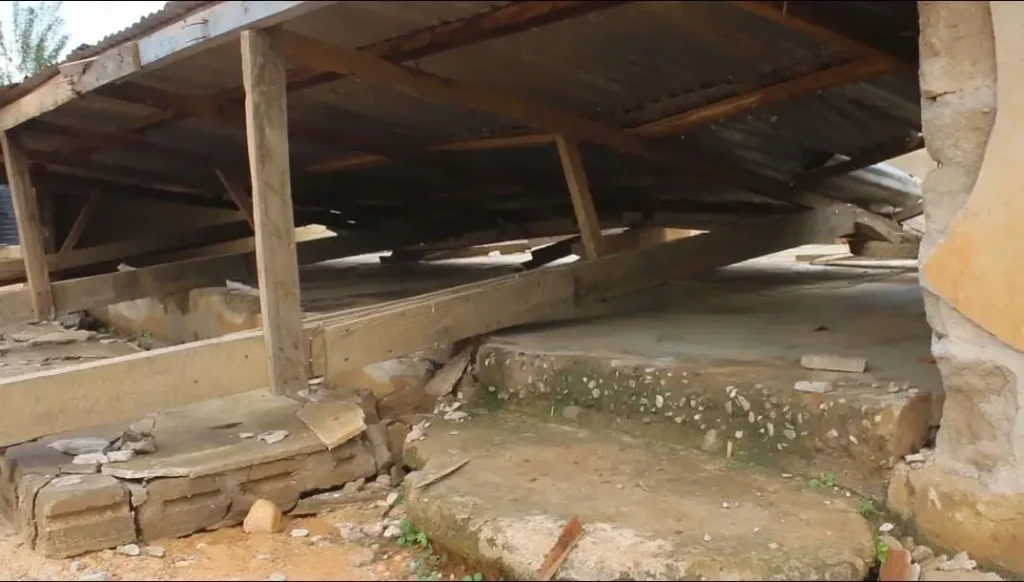The Presbyterian Senior High School (PRESEC) in Suhum, Eastern Region, finds itself grappling with a severe infrastructure crisis that threatens to disrupt the upcoming academic year. The recent collapse of a two-unit classroom block due to a rainstorm has exacerbated existing challenges, leaving the school scrambling to find space for the incoming first-year students. The dilapidated state of the school’s facilities, including a crumbling fence wall and several unfinished construction projects, paints a bleak picture of the learning environment. Established 31 years ago, the school has consistently struggled with inadequate resources, a situation further strained by the increased student population brought on by the government’s Free Senior High School policy and its accompanying Double Track system. This influx of students has stretched the existing infrastructure to its breaking point, leaving the administration struggling to provide a conducive learning environment. The collapse of the classroom block represents a significant setback, forcing the school to utilize an incomplete dining hall and a stalled administration block as makeshift classrooms, further highlighting the dire circumstances.
The collapse of the classroom block has not only reduced the available learning space but also created safety concerns, particularly for female students. The rainstorm that caused the building’s collapse also damaged the school’s perimeter wall, creating breaches that compromise the security of the campus. This has led to incidents of female students leaving the school grounds at unauthorized hours, raising concerns about their safety and well-being. The headmaster, Edwin Odame Amoah, has expressed grave concern about the situation, emphasizing the urgency of addressing the infrastructure deficit before the arrival of the new students. He highlights the lack of adequate classroom space and the security risks posed by the damaged fence as pressing issues that demand immediate attention. The urgency of the situation is echoed by students, who underscore the importance of the collapsed classroom and the disruption its absence has caused. They plead for swift intervention to restore the lost learning space and ensure a safe and conducive learning environment.
The school’s infrastructure challenges are not isolated but reflect a broader systemic problem affecting numerous senior high schools across Ghana. The implementation of the Free Senior High School policy, while commendable in its aim to improve access to education, has inadvertently placed immense pressure on existing school facilities. The Double Track system, designed to manage the increased student population, has further complicated matters, creating logistical and pedagogical challenges. Many schools are struggling to cope with the influx of students, resulting in overcrowded classrooms, inadequate resources, and a strained learning environment. The situation at Suhum PRESEC serves as a microcosm of the broader infrastructure crisis facing Ghana’s education system. The lack of adequate classrooms, coupled with the deterioration of existing facilities, highlights the need for significant investment in school infrastructure to accommodate the increased demand for secondary education.
Despite the daunting challenges, Suhum PRESEC has demonstrated academic resilience. The school managed to achieve a commendable 75% pass rate in the 2024 West African Senior School Certificate Examination (WASSCE), a testament to the dedication of the teachers and students in overcoming adversity. This achievement underscores the potential of the school and the importance of addressing the infrastructure deficit to unlock its full potential. Providing a conducive learning environment would undoubtedly further enhance the academic performance of the students and empower them to reach even greater heights. The school’s ability to achieve such a pass rate amidst the prevailing infrastructure challenges signifies the commitment and dedication of both the teaching staff and students to excel despite the difficult circumstances.
The Parliamentary Select Committee on Education has acknowledged the widespread infrastructure needs of senior high schools in Ghana. Following a visit to the region, the committee chairman, Peter Nortsu Kotoe, emphasized the urgency of government intervention to address the situation. He called for the allocation of resources to complete stalled projects and ensure that students have access to conducive learning environments. This acknowledgement from the parliamentary committee highlights the seriousness of the issue and the need for a coordinated government response to address the infrastructure gap across the country. The call for increased government funding underscores the importance of investing in education to secure a brighter future for Ghana’s youth.
The situation at Suhum PRESEC is a clear indication of the pressing need for increased investment in educational infrastructure. While the Free Senior High School policy has broadened access to education, its success hinges on the availability of adequate resources and facilities. The case of Suhum PRESEC serves as a stark reminder of the consequences of neglecting infrastructure development. The collapse of the classroom block, the compromised security, and the overall strain on resources all point to the urgent need for action. A comprehensive and sustained investment in school infrastructure is crucial not only to accommodate the current student population but also to ensure the long-term sustainability and quality of Ghana’s education system. Addressing the infrastructure deficit will contribute to creating a more conducive and secure learning environment, enabling students to reach their full potential and fostering a brighter future for the nation.














